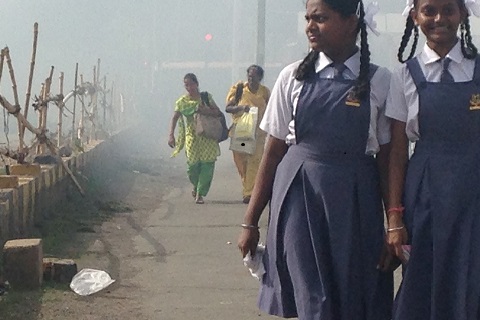Travelling by car recently in Mumbai, I witnessed the worst pollution I’ve seen in India. Construction work had shrouded the area in a dense, chemical fog. Shadowy people emerged ghost-like, cars were swallowed whole and the moment was as beautiful as it was disturbing.
I asked my driver to let me out. I wasn’t sure what I was looking for, and all I had was my iPhone and not much in the way of camera skills – but there was something about the scene that I wanted to capture, so I sat on a ledge near the curb and waited.
Every documentary filmmaker, no matter how cynical, is actually an optimist – convinced that if they just wait and watch, life will reward them with a moment filled with magic. The key difference between us and feature filmmakers is that by and large, we don’t create moments. We wait for them, and, in that waiting, we admit and acquiesce to the supremacy and power of fate.
It was with this same combination of optimism and acceptance that I set out to release my film, The World Before Her, in India.
The film, a Canadian production that took four years to make, follows two parallel real-life stories: on the one hand, the behind-the-scenes struggles of the 20 young women vying for the Miss India 2011 title and, on the other, the experiences of young women in a training camp for fundamentalists. Most people in India aren’t aware that such camps exist and the Hindu fundamentalists would like to keep it that way. The access we had to each world was unprecedented, and ultimately we ended up with a powerful, controversial and intimate story about what it means to be a woman in contemporary India.
Violence against women and girls in India is not just widespread, it’s woven into the very fabric of society. But after the Delhi rape in December 2012, the country awakened to how vulnerable many Indian women are, and how much it needs to do in the area of women’s rights.
Most documentary filmmakers have one goal – sharing their films to effect some kind of change. Every now and then, we get lucky. We find a story that captures the zeitgeist and has potential to become a lightning rod for discussion, introspection and real change. That’s what we have with The World Before Her. In the 18 months following its completion, the film has screened at countless festivals and won 20 awards and distinctions.
We didn’t initially intend to release the film theatrically in India. And then two things happened: the Delhi rape, and public screenings in India. Everybody was talking about it: activists, homemakers, students, women.
So starting on June 6, we launched a six-month campaign to screen the film across India. We released it in theatres and on the Net, and we’ve travelled with it to schools, universities and places where people would never have access to this kind of story. This October, we’ll begin screenings at colleges/universities and in areas where rates of female foeticide are high and female infanticide is still practised.

The World Before Her has become India’s most successful documentary release and has been nominated for an Emmy in the U.S. But for me, some of the most gratifying reaction to the film has come from young men. Many have posted on Facebook or written to me about what the film makes them feel, how it makes them think about their own privilege and prompts them to question why things are so difficult for women in India. They wonder what their own role is, and how they can bring about change.
We hope people who see the film, particularly young people, think about the way women in India are viewed, and that they rethink the value of their daughters.
Nisha Pahuja (BA 1994 UTM) is a Canadian documentary film producer. The World Before Her won Best Canadian Feature at the 2012 Hot Docs Canadian International Documentary Festival.
Watch: the trailer for The World Before Her, as shown in India
Recent Posts
For Greener Buildings, We Need to Rethink How We Construct Them
To meet its pledge to be carbon neutral by 2050, Canada needs to cut emissions from the construction industry. Architecture prof Kelly Doran has ideas
U of T’s 197th Birthday Quiz
Test your knowledge of all things U of T in honour of the university’s 197th anniversary on March 15!
Are Cold Plunges Good for You?
Research suggests they are, in three ways




